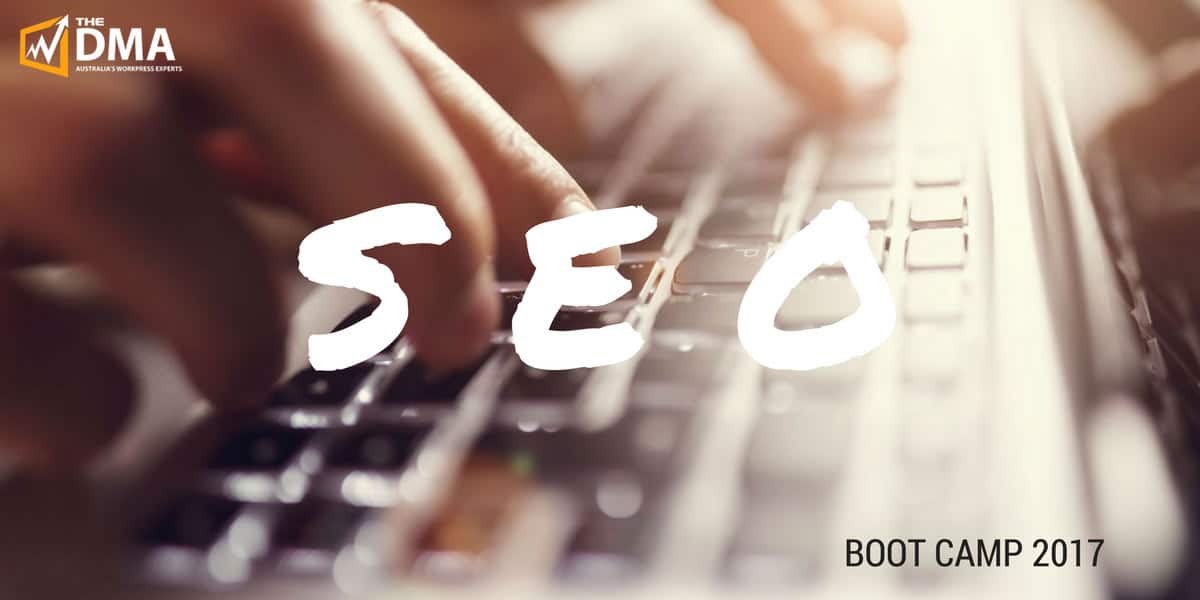WordPress SEO: Understanding the basics of search engine optimisation
This is part of our WordPress SEO Boot Camp. Aimed at business owners, marketing professionals and other responsible for website content, we explain SEO. We break down SEO into the major techniques used to enhance a web site's performance and ranking in major search engines.

This article is the first of a series that we are publishing during April for those signed up to our WordPress SEO Boot Camp.
We all know what SEO is right?
Not so sure? Well let’s not take anything for granted. Let’s spell it out so that we have a concise, useful definition to work with.
Let’s begin with the acronym: Search Engine Optimisation. Ok you probably knew that so let’s talk more about what it actually is.
SEO is a collection of techniques, that when pulled together result in your website ranking well. That is, it comes up on the first one or two pages of a Google search.
As always though the devil is in the detail. I’m going to outline some of the main techniques below to familiarise you with them a little more. Before we do that I’d like to make a point: You, the business owner / marketing person / who ever you might be – can actually do a lot yourself to improve your standing in the major search engines. It all starts with a basic understanding of how SEO works. Sure some items you might need a little technical help, so ask for it when you’re out of your depth. Let’s dig in and discuss these mysterious techniques. :)
1) Understand Google’s mission
Google’s mission is to organize the world’s information and make it universally accessible and useful
From an SEO perspective the mission statements sounds reasonable. Understand that Google implements its mission statement consistently in products and services. The mission statement impacts SEO, a lot, at a much deeper level.
Google wants a user on its search engine to get the answer to their question, as quickly as possible. Many of the policies that are implement by Google here are directly in response to their mission statement. More on this as we discuss other techniques below.
2) SEO: it’s all about the text on the page
Okay, may not all about the text but it plays a significant role.
To begin with, ensure you understand that Google reads the text on your web pages. If you want to rank well when a user searches for Financial Planner in Sydney you have to have words to that effect, in your web pages. 10 years ago I would have said “those exact words” but thing have moved on, I’ll explain that in more detail below.
Key points
- Ensure you are writing about your products and services a lot on your web pages using the same language that a potential visitor might use
- The words need to be text on your pages; not text that is in an image or video
3) Where you place the text on the page matters
Google has a sophisticated method (often you’ll hear it referred to as “the Google Algorithm“) that works out which pages it will favour. Which pages will be placed at the top of the search results and which pages will… well never be seen by anyone.
Part of this method is to understand, actually comprehend the content on your pages. By learning some simple techniques on how Google weights different parts of a web page, you can help Google understand which are the main topics that are presented in your web page.
Key points
- Take the time to learn about simple web page structure (not coding, HTML etc.. but the structure of a page of content)
- Implement what you learn to all of your existing pages AND to all new content that you add in the future
In our SEO Boot Camp you are going to learn more about this in weeks 2 and 3.
4) Keywords keywords keywords – what is it all about?
If you’ve listened or read much about SEO you would have heard people talking about keywords. Yes, there is a technique to learn. Yes there are very sophisticated methods that are used to work out which keywords should be used. Do you have time of all of this? Probably not. So let’s strip it back to the basics and at least get that nailed.
What you need to do is talk about your product, services, outcomes etc.. in your web pages. And as stated previously, in the language of your potential client. If you’re an expert in a particular field, you’ll tend to use a lot of jargon, try and use simple language. Picture one of your clients. An actual person. Sitting in front of their computer, what would they search for.
As well as this you need to refer to your location. If you’re a location based business (i.e. you operate in one city or region) then you need to reference your location more than you think.
People search for things like: “landscaper in Mona Vale“. Think: product or service plus location.
Key points
- You need to stop and think about this a little
- Agree on the common phrases and terms that you want to focus on
- Write them down, perhaps in a simple spreadsheet
- Use them regularly in all of your new content and if you can go back and look at your existing web pages with this new perspective
- Ensure that everyone that is working on your website content is across this and is ( bad SEO pun coming ) on the same page
If you’re going to improve your SEO, you do need to get a simple plan around keywords. In our SEO Boot Camp series we are going to expand on this idea in week 2.
5) Your website needs to be fast
Back to Google’s mission statement. To give a user the best experience the search engine wants to deliver them to a webpage that answers their question, quickly. Literally. As fast as possible. This means that your WordPress hosting should be delivering your pages as quickly as possible.
If you’re sitting there waiting for more than 2 or 3 seconds for an individual page to load, things need to be improved. Again, there are loads of advanced techniques to evaluate page load, start with the basics though. If it loads nice and snappy for you then you’re probably ok. If you’re waiting a lot for individual pages to load, it’s time to act.
Still on the same topic. I want to cover another quick, related point. Even with the best WordPress hosting, if the images that you upload into your site are too large then you’ll still have problems. The file size of your images need to be as small as possible so that they can be delivered to your users quickly. Mobile devices in particular are not always on high speed Internet connections, large images will have an even bigger negative impact here. Sure this is a little general but under 100KB is a good rule of thumb. Even smaller if possible.
Key points
- Ensure your web pages (all of them not just the home page) load quickly
6) Your website needs to be mobile responsive
Again, keeping Google’s mission statement in mind here. Your website needs to work well on desktop computers as well as tablet devices like iPads down to smartphones. For a user on a mobile device, Google will actively show websites that will work well on the searcher’s device. Keeping the best possible experience for the user front and centre. If you site does is not mobile responsive Google will push you down the search rankings or even not show your site at all to a user on a smartphone / iPad.

Reader Interactions